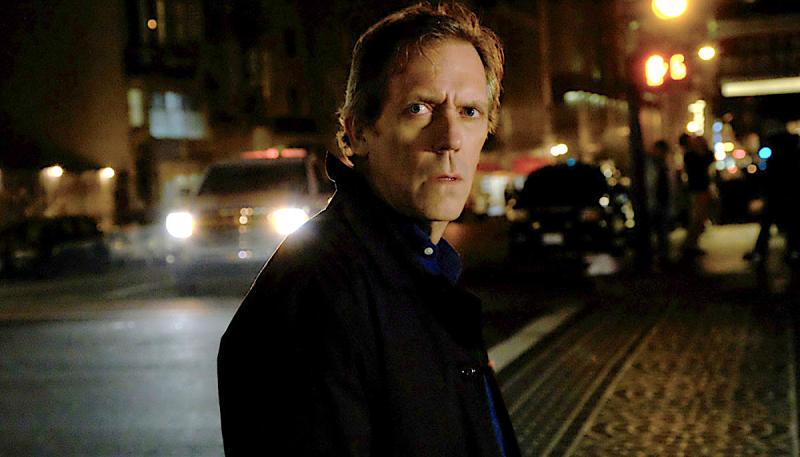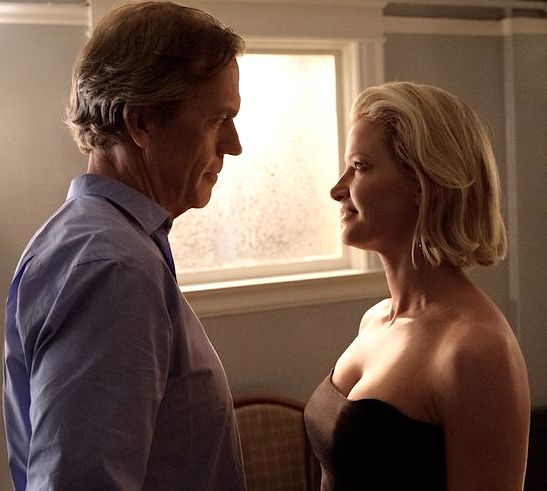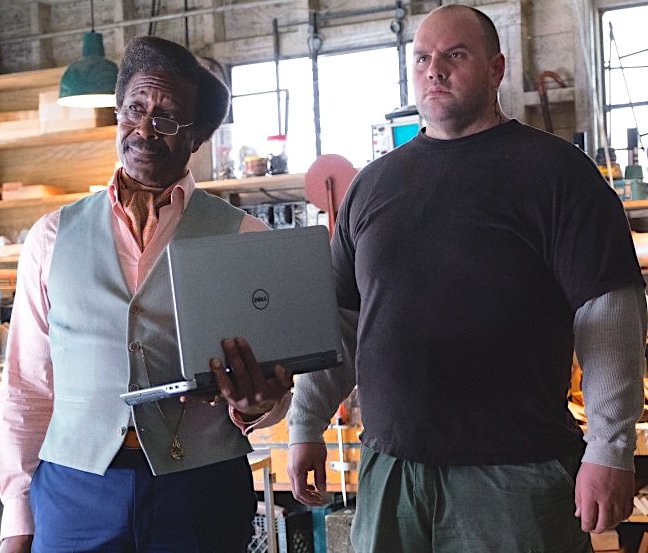Chance, Universal review – Hugh Laurie is reborn as a film-noir shrink | reviews, news & interviews
Chance, Universal review – Hugh Laurie is reborn as a film-noir shrink
Chance, Universal review – Hugh Laurie is reborn as a film-noir shrink
Dr House finds a new home in San Francisco

Hugh Laurie, in his new role of forensic neuropsychiatrist Eldon Chance, tells us that he works with those who are “mutilated by life”, and we soon see that Chance himself falls into that category. He’s in the midst of a divorce, he only sees his daughter Nicole at weekends, and his work seems to fill him with a kind of morbid weariness.
This is Laurie playing the flip side of Dr Gregory House, the brilliant and fearless diagnostician happy to break every rule and offend whomever it may concern in pursuit of the right result. Chance, on the other hand, is timid and full of doubt, and even his job is somewhat equivocal. He doesn’t treat patients so much as assess them and then refer them to a relevant specialist, like a kind of psychological traffic cop.
 He’s a walking mid-life crisis, and thus when a glamorous but deeply troubled new patient walks into his consulting room, he’s a sitting duck. Jaclyn Blackstone (Gretchen Mol, pictured right with Laurie) could be one of Raymond Chandler’s fatal femmes, a mysterious blonde with a split personality and a cruel, abusive husband. The damaged and fearful Jaclyn Blackstone, it seems, is sometimes replaced by the vampish and sexually assertive Jackie Black, but she never knows when the switch may occur.
He’s a walking mid-life crisis, and thus when a glamorous but deeply troubled new patient walks into his consulting room, he’s a sitting duck. Jaclyn Blackstone (Gretchen Mol, pictured right with Laurie) could be one of Raymond Chandler’s fatal femmes, a mysterious blonde with a split personality and a cruel, abusive husband. The damaged and fearful Jaclyn Blackstone, it seems, is sometimes replaced by the vampish and sexually assertive Jackie Black, but she never knows when the switch may occur.
Adapted by Kem Nunn from his own novel, Chance feels like a noirish crime thriller but with added subconscious layers, which make you start to wonder who really is the patient. With its San Francisco setting and theme of dual identity (and a protagonist potentially being duped), there are clear echoes of Hitchcock’s Vertigo, cunningly amplified by Bernard Herrmann-like tones on the soundtrack.
Details of Chance’s milieu and state of mind are sketched in by means of him delivering capsule diagnoses of some of his patients (for instance a man called Bernard, who suffers hallucinations after being hit by a truck and attacks people who remind him of the driver). When Chance unwisely – in fact, insanely – sets up a date to meet Jaclyn in a restaurant, he’s startled when her husband Raymond (Paul Adelstein) walks in (it doesn’t help that he’s a cop), but his tactic for defusing the situation is to tell a rambling anecdote about the nature of coincidence, featuring a woman being hit by a falling chandelier. Jaclyn herself has just been to a university lecture entitled The Axiom of Choice, so it’s safe to say that Mr Nunn enjoys playing amusing mind-games with his audience.
 Despite his depressive unassertiveness, Chance somehow can’t help walking on the wild side. His colleague Suzanne (LisaGay Hamilton) keeps warning him urgently about not getting involved with patients – he has a history of this sort of thing – but he doesn’t listen. Meanwhile, he also finds himself involved in a so-far inexplicable bout of underworld violence, triggered by a visit to his charming but ever-so-slightly unscrupulous furniture-restorer Carl (Clarke Peters). Carl has a henchman called D (Ethan Suplee, pictured above with Peters), a monosyllabic man-mountain who takes Chance on a tour of the Tenderloin district and calmly dispatches a group of pursuing muggers with extreme violence.
Despite his depressive unassertiveness, Chance somehow can’t help walking on the wild side. His colleague Suzanne (LisaGay Hamilton) keeps warning him urgently about not getting involved with patients – he has a history of this sort of thing – but he doesn’t listen. Meanwhile, he also finds himself involved in a so-far inexplicable bout of underworld violence, triggered by a visit to his charming but ever-so-slightly unscrupulous furniture-restorer Carl (Clarke Peters). Carl has a henchman called D (Ethan Suplee, pictured above with Peters), a monosyllabic man-mountain who takes Chance on a tour of the Tenderloin district and calmly dispatches a group of pursuing muggers with extreme violence.
It's teasing and intriguing, but despite the directorial hand of Lenny (Room) Abrahamson on the opening two episodes, so far the elements aren’t quite gelling. Maybe it needs time to grow.
rating
Explore topics
Share this article
The future of Arts Journalism
You can stop theartsdesk.com closing!
We urgently need financing to survive. Our fundraising drive has thus far raised £49,000 but we need to reach £100,000 or we will be forced to close. Please contribute here: https://gofund.me/c3f6033d
And if you can forward this information to anyone who might assist, we’d be grateful.

Subscribe to theartsdesk.com
Thank you for continuing to read our work on theartsdesk.com. For unlimited access to every article in its entirety, including our archive of more than 15,000 pieces, we're asking for £5 per month or £40 per year. We feel it's a very good deal, and hope you do too.
To take a subscription now simply click here.
And if you're looking for that extra gift for a friend or family member, why not treat them to a theartsdesk.com gift subscription?
more TV
 theartsdesk Q&A: Suranne Jones on 'Hostage', power pants and politics
The star and producer talks about taking on the role of Prime Minister, wearing high heels and living in the public eye
theartsdesk Q&A: Suranne Jones on 'Hostage', power pants and politics
The star and producer talks about taking on the role of Prime Minister, wearing high heels and living in the public eye
 King & Conqueror, BBC One review - not many kicks in 1066
Turgid medieval drama leaves viewers in the dark
King & Conqueror, BBC One review - not many kicks in 1066
Turgid medieval drama leaves viewers in the dark
 Hostage, Netflix review - entente not-too-cordiale
Suranne Jones and Julie Delpy cross swords in confused political drama
Hostage, Netflix review - entente not-too-cordiale
Suranne Jones and Julie Delpy cross swords in confused political drama
 In Flight, Channel 4 review - drugs, thugs and Bulgarian gangsters
Katherine Kelly's flight attendant is battling a sea of troubles
In Flight, Channel 4 review - drugs, thugs and Bulgarian gangsters
Katherine Kelly's flight attendant is battling a sea of troubles
 Alien: Earth, Disney+ review - was this interstellar journey really necessary?
Noah Hawley's lavish sci-fi series brings Ridley Scott's monster back home
Alien: Earth, Disney+ review - was this interstellar journey really necessary?
Noah Hawley's lavish sci-fi series brings Ridley Scott's monster back home
 The Count of Monte Cristo, U&Drama review - silly telly for the silly season
Umpteenth incarnation of the Alexandre Dumas novel is no better than it should be
The Count of Monte Cristo, U&Drama review - silly telly for the silly season
Umpteenth incarnation of the Alexandre Dumas novel is no better than it should be
 The Narrow Road to the Deep North, BBC One review - love, death and hell on the Burma railway
Richard Flanagan's prize-winning novel becomes a gruelling TV series
The Narrow Road to the Deep North, BBC One review - love, death and hell on the Burma railway
Richard Flanagan's prize-winning novel becomes a gruelling TV series
 The Waterfront, Netflix review - fish, drugs and rock'n'roll
Kevin Williamson's Carolinas crime saga makes addictive viewing
The Waterfront, Netflix review - fish, drugs and rock'n'roll
Kevin Williamson's Carolinas crime saga makes addictive viewing
 theartsdesk Q&A: writer and actor Mark Gatiss on 'Bookish'
The multi-talented performer ponders storytelling, crime and retiring to run a bookshop
theartsdesk Q&A: writer and actor Mark Gatiss on 'Bookish'
The multi-talented performer ponders storytelling, crime and retiring to run a bookshop
 Ballard, Prime Video review - there's something rotten in the LAPD
Persuasive dramatisation of Michael Connelly's female detective
Ballard, Prime Video review - there's something rotten in the LAPD
Persuasive dramatisation of Michael Connelly's female detective
 Bookish, U&Alibi review - sleuthing and skulduggery in a bomb-battered London
Mark Gatiss's crime drama mixes period atmosphere with crafty clues
Bookish, U&Alibi review - sleuthing and skulduggery in a bomb-battered London
Mark Gatiss's crime drama mixes period atmosphere with crafty clues
 Too Much, Netflix - a romcom that's oversexed, and over here
Lena Dunham's new series presents an England it's often hard to recognise
Too Much, Netflix - a romcom that's oversexed, and over here
Lena Dunham's new series presents an England it's often hard to recognise

Add comment